Serving 271 students in grades Kindergarten-8, Wasuma Elementary School ranks in the bottom 50% of all schools in California for overall test scores (math proficiency is top 50%, and reading proficiency is top 50%).
The percentage of students achieving proficiency in math is 25-29% (which is lower than the California state average of 33%). The percentage of students achieving proficiency in reading/language arts is 35-39% (which is lower than the California state average of 47%).
The student:teacher ratio of 18:1 is lower than the California state level of 21:1.
Minority enrollment is 29% of the student body (majority Hispanic), which is lower than the California state average of 80% (majority Hispanic).
Quick Stats (2025)
- Grades: Kindergarten-8
- Enrollment: 271 students
- Student:Teacher Ratio: 18:1
- Minority Enrollment: 29%
- Overall Testing Rank: Bottom 50% in CA
- Math Proficiency: 25-29% (Top 50%)
- Reading Proficiency: 35-39% (Btm 50%)
- Science Proficiency: 20-24% (Btm 50%)
- Source: National Center for Education Statistics (NCES), CA Dept. of Education
Top Rankings
Wasuma Elementary School ranks among the top 20% of public schools in California for:
Category
Attribute
Student Attention
School Overview
Wasuma Elementary School's student population of 271 students has declined by 9% over five school years.
The teacher population of 15 teachers has grown by 15% over five school years.
Grades Offered
Grades Kindergarten-8
Total Students
271 students
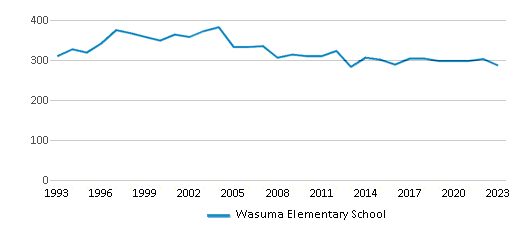
Gender %
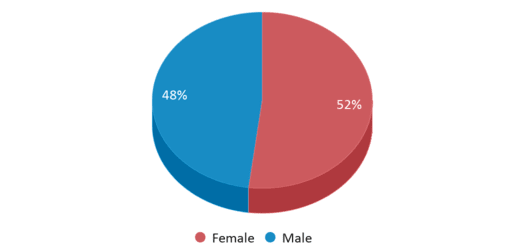
Total Classroom Teachers
15 teachers
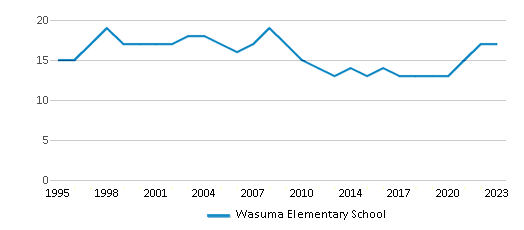
Students by Grade
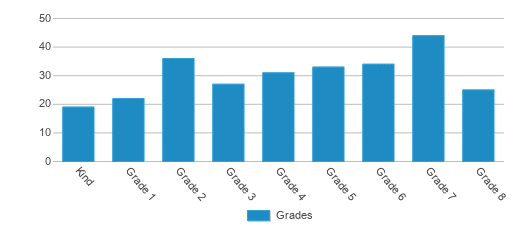
School Rankings
Wasuma Elementary School ranks within the bottom 50% of all 9,602 schools in California (based off of combined math and reading proficiency testing data).
The diversity score of Wasuma Elementary School is 0.45, which is less than the diversity score at state average of 0.63. The school's diversity has stayed relatively flat over five school years.
Overall Testing Rank
#5091 out of 9602 schools
(Bottom 50%)
(Bottom 50%)
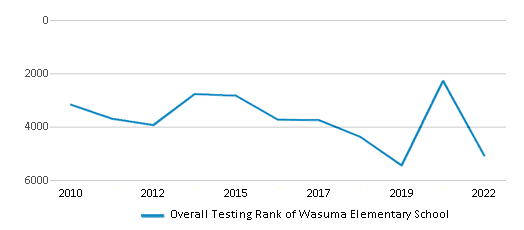
Math Test Scores (% Proficient)
25-29%
33%
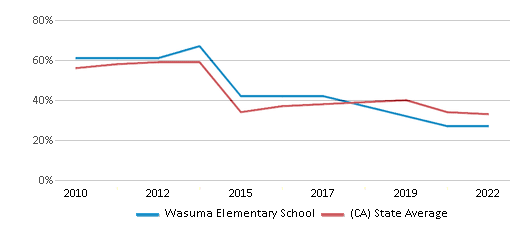
Reading/Language Arts Test Scores (% Proficient)
35-39%
47%
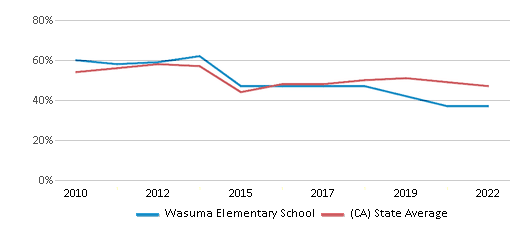
Science Test Scores (% Proficient)
20-24%
29%
Student : Teacher Ratio
18:1
21:1
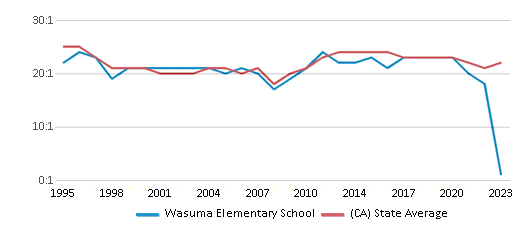
American Indian
1%
1%
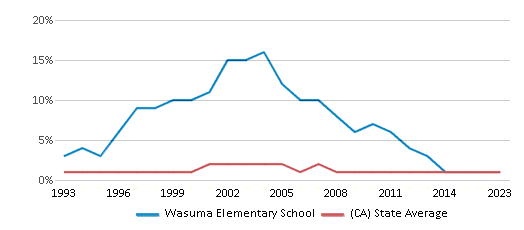
Asian
1%
12%
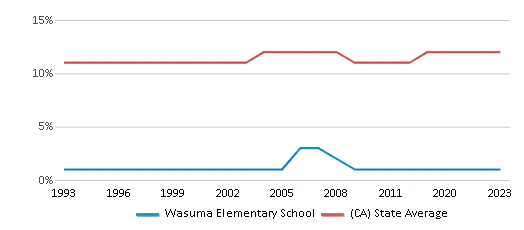
Hispanic
21%
56%
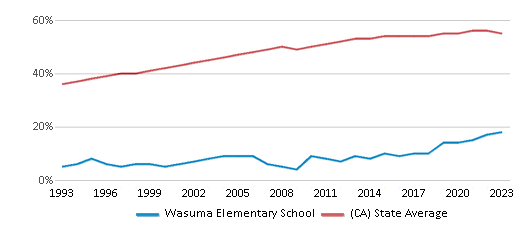
Black
n/a
5%
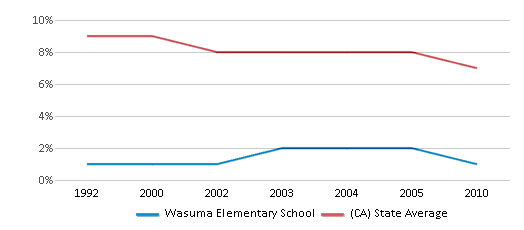
White
71%
20%
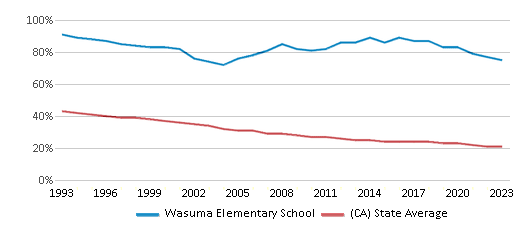
Hawaiian
n/a
n/a
Two or more races
6%
6%
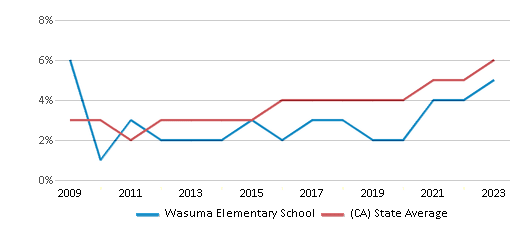
All Ethnic Groups
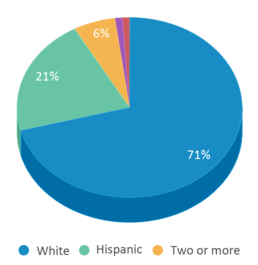
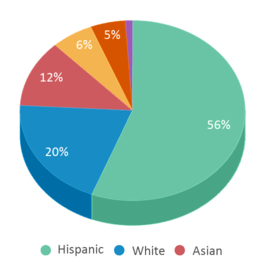
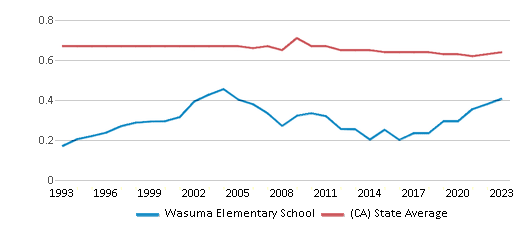
Eligible for Free Lunch
46%
54%
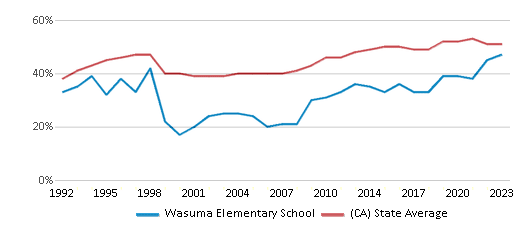
Eligible for Reduced Lunch
12%
8%
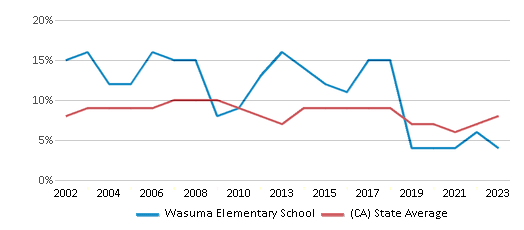
School Statewide Testing
School District Name
Source: National Center for Education Statistics (NCES), CA Dept. of Education
Profile last updated: 02/09/2025
Frequently Asked Questions
What is Wasuma Elementary School's ranking?
Wasuma Elementary School is ranked #5091 out of 9,602 schools, which ranks it among the bottom 50% of public schools in California.
What schools are Wasuma Elementary School often compared to?
Wasuma Elementary Schoolis often viewed alongside schools like Sierra View Elementary School, North Fork Elementary School by visitors of our site.
What percent of students have achieved state testing proficiency in math and reading?
25-29% of students have achieved math proficiency (compared to the 33% CA state average), while 35-39% of students have achieved reading proficiency (compared to the 47% CA state average).
How many students attend Wasuma Elementary School?
271 students attend Wasuma Elementary School.
What is the racial composition of the student body?
71% of Wasuma Elementary School students are White, 21% of students are Hispanic, 6% of students are Two or more races, 1% of students are American Indian, and 1% of students are Asian.
What is the student:teacher ratio of Wasuma Elementary School?
Wasuma Elementary School has a student ration of 18:1, which is lower than the California state average of 21:1.
What grades does Wasuma Elementary School offer ?
Wasuma Elementary School offers enrollment in grades Kindergarten-8
What school district is Wasuma Elementary School part of?
Wasuma Elementary School is part of Bass Lake Joint Union Elementary School District.
School Reviews
5 2/26/2018
This is not a review, this is Richard marts,, I went to wasuma in 1965- 66 ,,,I was seeking pics of my class and my wonderful teacher Mrs holiday , would you please send this e- mail to the right person please,,my e-mail is 1544rocky@gmail.com,,phone # 316-217-3237
5 12/22/2008
As a parent of a Wasuma wildcat my number one complaint is the tolerance from the principle when it comes to bullies. Her own son is a bully, he has been disiplined by his teachers time and time again, but nothing comes of it. The principle (his mother) excuses it, returning him from the principles office with a candy instead of a suspension. Other kids see it go unpunished and have taken up the same behavior. The behavior is ignored throughout the campus. There is a good old boys or girls club that exists at Wasuma. If your not part of the clan, your complaints of bulling fall on deaf ears. Its a shame, as a past Wasuma Wildcat the school is not living up to its reputation.
Review Wasuma Elementary School. Reviews should be a few sentences in length. Please include any comments on:
- Quality of academic programs, teachers, and facilities
- Availability of music, art, sports and other extracurricular activities
Recent Articles

What Is A Charter School?
Explore the world of charter schools in this comprehensive guide. Learn about their history, how they operate, and the pros and cons of this educational innovation. Discover key facts about charter schools, including admission policies, demographics, and funding, as well as what to look for when considering a charter school for your child.

10 Reasons Why High School Sports Benefit Students
Discover the 10 compelling reasons why high school sports are beneficial for students. This comprehensive article explores how athletics enhance academic performance, foster personal growth, and develop crucial life skills. From improved fitness and time management to leadership development and community representation, learn why participating in high school sports can be a game-changer for students' overall success and well-being.

February 05, 2025
Understanding the U.S. Department of Education: Structure, Impact, and EvolutionWe explore how the Department of Education shapes American education, from its cabinet-level leadership to its impact on millions of students, written for general audiences seeking clarity on this vital institution.





